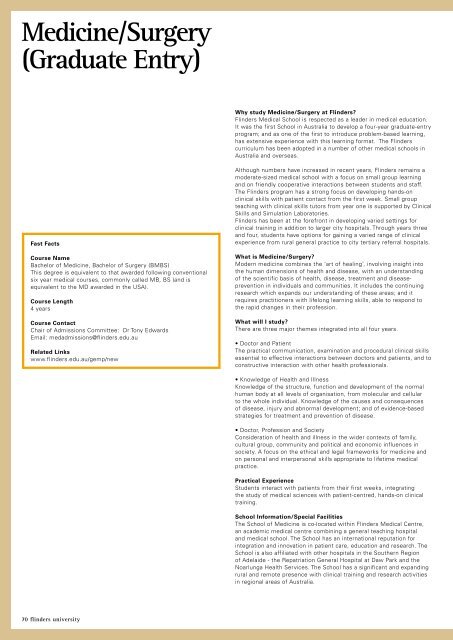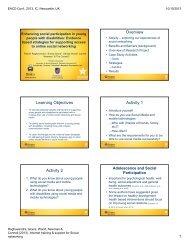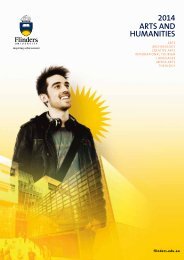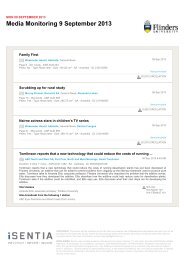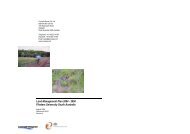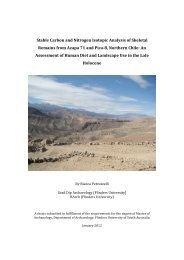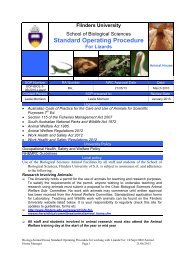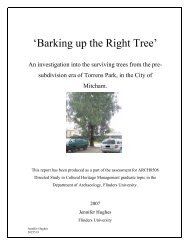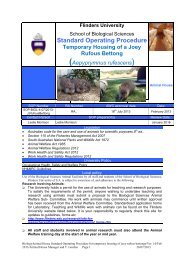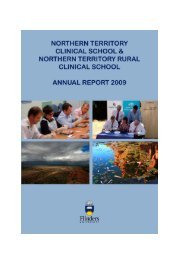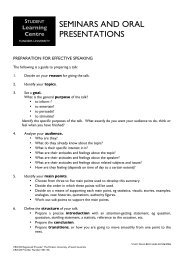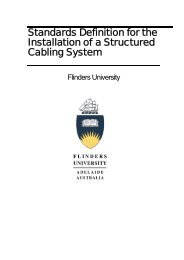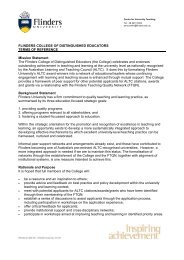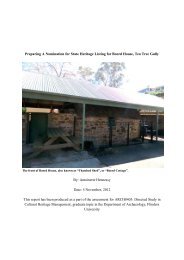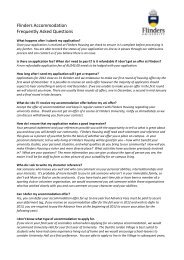Undergraduate - Flinders University
Undergraduate - Flinders University
Undergraduate - Flinders University
Create successful ePaper yourself
Turn your PDF publications into a flip-book with our unique Google optimized e-Paper software.
Medicine/Surgery<br />
(Graduate Entry)<br />
Fast Facts<br />
Course Name<br />
Bachelor of Medicine, Bachelor of Surgery (BMBS)<br />
this degree is equivalent to that awarded following conventional<br />
six year medical courses, commonly called MB, BS (and is<br />
equivalent to the Md awarded in the uSa).<br />
Course Length<br />
4 years<br />
Course Contact<br />
Chair of admissions Committee: dr tony edwards<br />
email: medadmissions@flinders.edu.au<br />
Related Links<br />
www.flinders.edu.au/gemp/new<br />
70 flinders university<br />
Why study Medicine/Surgery at <strong>Flinders</strong>?<br />
<strong>Flinders</strong> Medical School is respected as a leader in medical education.<br />
It was the first School in australia to develop a four-year graduate-entry<br />
program; and as one of the first to introduce problem-based learning,<br />
has extensive experience with this learning format. the <strong>Flinders</strong><br />
curriculum has been adopted in a number of other medical schools in<br />
australia and overseas.<br />
although numbers have increased in recent years, <strong>Flinders</strong> remains a<br />
moderate-sized medical school with a focus on small group learning<br />
and on friendly cooperative interactions between students and staff.<br />
the <strong>Flinders</strong> program has a strong focus on developing hands-on<br />
clinical skills with patient contact from the first week. Small group<br />
teaching with clinical skills tutors from year one is supported by Clinical<br />
Skills and Simulation Laboratories.<br />
<strong>Flinders</strong> has been at the forefront in developing varied settings for<br />
clinical training in addition to larger city hospitals. through years three<br />
and four, students have options for gaining a varied range of clinical<br />
experience from rural general practice to city tertiary referral hospitals.<br />
What is Medicine/Surgery?<br />
Modern medicine combines the ‘art of healing’, involving insight into<br />
the human dimensions of health and disease, with an understanding<br />
of the scientific basis of health, disease, treatment and diseaseprevention<br />
in individuals and communities. It includes the continuing<br />
research which expands our understanding of these areas; and it<br />
requires practitioners with lifelong learning skills, able to respond to<br />
the rapid changes in their profession.<br />
What will I study?<br />
there are three major themes integrated into all four years.<br />
• Doctor and Patient<br />
the practical communication, examination and procedural clinical skills<br />
essential to effective interactions between doctors and patients, and to<br />
constructive interaction with other health professionals.<br />
• Knowledge of Health and Illness<br />
Knowledge of the structure, function and development of the normal<br />
human body at all levels of organisation, from molecular and cellular<br />
to the whole individual. Knowledge of the causes and consequences<br />
of disease, injury and abnormal development; and of evidence-based<br />
strategies for treatment and prevention of disease.<br />
• Doctor, Profession and Society<br />
Consideration of health and illness in the wider contexts of family,<br />
cultural group, community and political and economic influences in<br />
society. a focus on the ethical and legal frameworks for medicine and<br />
on personal and interpersonal skills appropriate to lifetime medical<br />
practice.<br />
Practical Experience<br />
Students interact with patients from their first weeks, integrating<br />
the study of medical sciences with patient-centred, hands-on clinical<br />
training.<br />
School Information/Special Facilities<br />
the School of Medicine is co-located within <strong>Flinders</strong> Medical Centre,<br />
an academic medical centre combining a general teaching hospital<br />
and medical school. the School has an international reputation for<br />
integration and innovation in patient care, education and research. the<br />
School is also affiliated with other hospitals in the Southern region<br />
of adelaide - the repatriation general Hospital at daw Park and the<br />
noarlunga Health Services. the School has a significant and expanding<br />
rural and remote presence with clinical training and research activities<br />
in regional areas of australia.<br />
Why study Nanotechnology at <strong>Flinders</strong>?<br />
this pioneering degree prepares scientists for the new industrial<br />
revolution. It was the first degree of its type in australia.<br />
It also provides insights into business, enterprise management,<br />
commerce and economics, and legal issues such as intellectual<br />
property, all of which are vital components for any professional<br />
scientist working in business and industry.<br />
Industry placements in the final year of the course allow students to<br />
engage with the workplace environment they will be entering after<br />
graduation. graduates are equipped to start working immediately in a<br />
variety of scientific professions and to play a leading role in the future<br />
as nanotechnology grows, matures and reveals its full potential.<br />
What is Nanotechnology?<br />
nanotechnology is science at the molecular level. It is extremely<br />
multidisciplinary and brings together chemistry, physics, engineering,<br />
biology and biomedical sciences ‘to manufacture products of any size<br />
with atomic precision’. Like biotechnology and information technology<br />
it is a growth industry with the potential to change the world in which<br />
we live.<br />
It is a perfect example of how science can be applied in the workplace<br />
to create useful technologies. Some examples of projects underway<br />
include: building nanochips that interface with the human eye to help<br />
restore sight; making miniature machines that need no lubricants by<br />
building tiny moving parts into a silicon chip; and creating molecules<br />
that are tuneable to particular bacteria, viruses, or environmental<br />
pollutants.<br />
What will I study?<br />
nanotechnology draws on the strengths of all the basic sciences and<br />
the course will give you a strong background in these sciences. there<br />
is an emphasis on developing computational skills and an awareness of<br />
the roles and uses of computers in science and society.<br />
In first year you will take chemistry, physics, mathematics, biology, and<br />
a specialist nanotechnology topic. In subsequent years, you will take<br />
some core topics, then specialise in one of three areas.<br />
the Biomedical nanotechnology stream includes extensive studies in<br />
chemistry and biology.<br />
the Quantum nanostructures stream has a stronger emphasis<br />
on physics, chemistry and mathematics, including areas such as<br />
optoelectronics.<br />
Fourth year offers advanced level studies in your area of specialisation;<br />
a research project, while industry placements in the course allow<br />
students to engage with the workplace environment they will enter<br />
after graduation.<br />
Career Information<br />
graduates of the nanotechnology degree will have many opportunities<br />
at the boundaries of traditional science due to the cross-disciplinary<br />
nature of their degree. this will be further enhanced by their industry<br />
exposure through placements in the later years of the degree.<br />
Whatever the environment, commercial or research, these employment<br />
opportunities will be very exciting, at the cutting edge of technology.<br />
Fast Facts<br />
Nanotechnology<br />
Course Name<br />
Bachelor of Science (Honours) in nanotechnology<br />
Combined Degree<br />
Innovation and enterprise (Science and technology), diploma of<br />
Language<br />
Course Length<br />
4 years<br />
Graduate Profile<br />
tyler raeside<br />
Currently Studying Bachelor of nanotechnology (Hons)<br />
“nanotechnology provides a degree with that ‘little bit more’<br />
than a traditional science degree and is at the forefront of many<br />
research opportunities both domestically and internationally.<br />
<strong>Flinders</strong> has a nice campus atmosphere, friendly lecturers and an<br />
established reputation in the nanotechnology field. the course<br />
starts off with a broad focus and then allows you to narrow down<br />
to specific areas that you have an interest in. the subjects I have<br />
enjoyed the most are those that relate to the physics of surfaces<br />
and surface analysis techniques such as Quantum Phenomena,<br />
Optics and Lasers and the nanostructures topics. Overall I rate<br />
the teaching at <strong>Flinders</strong> at a very high standard.”<br />
Further Study Opportunities<br />
Master of nanotechnology, Phd<br />
Master of Science (research)<br />
Course Contact<br />
assoc Prof Joe Shapter, email: joe.shapter@flinders.edu.au<br />
Related Links<br />
nanotechnology - Courses & Programs of Study http://www.<br />
scieng.flinders.edu.au/courses/ugrad/nano.html<br />
inspiring achievement 71


